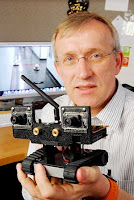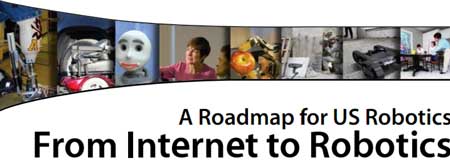 |
|
- 80% of jobs in the next decade will require math and science skills (NSF)
- Only 15% of American students will graduate with STEM degrees (US Bureau of Labor Statistics)
- Jobs involving robotics feature real-world challenges solved by research, critical thinking, construction, teamwork, and imagination (US FIRST)
The business of robotics in America (and around the world) centers around the universities that teach the subject and provide the research and resources. Clusters of spin-off businesses, investors and consultants flourish nearby and add commercial and entrepreneurial energy to the mix. Pittsburgh, Boston, the Bay Area (San Francisco and the Silicon Valley), and Atlanta are the major clusters in America and there are plenty of governmental, institutional, angel and venture capital entities and individuals with ties into those areas.
 |
| Aerial view of GA Tech with downtown Atlanta in the background. |

Georgia Tech focuses on practical innovation for society and industry – or as they say, GA Tech is all about creating value – and this can be seen in more than a dozen focused labs crossing three departmental boundaries: The College of Computing, College of Engineering and the Georgia Tech Research Institute**, all of which feed faculty, researchers, research funding and students into the business side of robotics.
- mechatronics
- agricultural technology
- biomedical imaging, neuro-engineering and bio-robotics
- perception and vision systems
- construction and architecture
- health care and medical robotics
- human-robot interaction
- embedded systems
- mobility and navigation systems
- unmanned aerial, underwater and ground vehicles
- simulation
Henrik Christensen is the director of Georgia Tech’s Robotics and Intelligent Machines Center and a Distinguished Professor of Computing. Christensen holds the KUKA Chair in Robotics. He was the founding chairman of the EU network of excellence in robotics – EURON (1999-2006), and remains a science advisor to the European Commission, as well as several international companies.
Christensen says of GA Tech’s track record in robotics:
GT has a very active incubator for creation of new companies. More than 340 companies have been spun-out and we have a new educational program to mentor students and faculty to easily spin-out companies. In terms of robotics and perception there has been a number of successes. DVT – by a retired GA Tech professor – was sold to Cognex a few years ago for $140 million and we have several other companies such as ShapeStart, Guided Systems, CAMotion, Qcept, … that have been successfully spun-out. On the average 2-3 robotics related companies are created every year. So overall the climate is very stimulating for creation of spin-off companies. We have ATDC as the incubator for new companies, EI² is our enterprise innovation institute and finally MEP is the manufacturing extension partnership for working with local companies.
One of Henrik’s principle tasks since his arrival at GA Tech has been in the development, dissemination and followup of a U.S. Roadmap for Robotics which has been gaining momentum since its initial presentation to Congress in 2009. Portions of that roadmap were included in President Obama’s AMP Initiative (Advanced Manufacturing Partnership). $70 million was allocated to focus on enabling new abilities for factory workers, health care providers, soldiers, surgeons and astronauts to carry out key hard-to-do tasks with co-robots… small, safe, easily trainable and flexible lightweight helper robots.
As an interesting aside, the Danish Technological Institute (DTI), a government-sponsored stimulus program to develop and apply robot technologies to Danish industry and society, has established a US subsidiary located in the Advanced Technology Development Center (ATDC) to search for and coordinate research projects and start-ups beneficial to Danish interests and using the full research resources of GA Tech. Their goal for their new US subsidiary is for it to become the equivalent of the Stanford Research Institute (SRI), but of and for Danish robotic interests.
[** The GA Tech Research Institute (GTRI) is the applied research arm of GA Tech and received $300 million in research funding last year alone. It has 1,600 employees of which 795 are faculty at GA Tech.]





Tell Us What You Think!